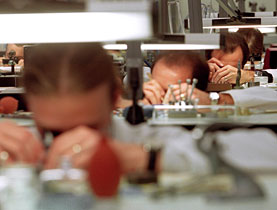
Is Switzerland heading for a recession?

Economists have downgraded expectations for Swiss economic growth next year with one respected think tank predicting a mini-recession in the coming months.
The latest round of global financial turbulence has increased pessimism, but Switzerland is still expected to weather the storm better than many countries thanks to its sound economic foundations.
On Monday, the KOF Swiss Economic Institute predicted negative growth over the next two financial quarters and dramatically revised its 2009 gross domestic product (GDP) prognosis from 1.8 per cent to a meagre 0.3 per cent.
“In the fourth quarter of this year and the first quarter of next year we will be moving around the zero growth rate. It might turn out to be slightly negative or positive but this is clearly is a short phase where the economy will come to a standstill,” KOF head Jan-Egbert Sturm told swissinfo.
September witnessed a new wave of problems for the financial markets stemming from the US sub-prime crisis. European authorities in recent days have been forced to step in and rescue several banks in Britain, Belgium, Germany and elsewhere. (see context).
But Sturm insisted that KOF’s revised forecast was based purely on deteriorating conditions in the European real economy – measured by such indicators as consumer demand, manufacturing output and employment rates.
“Given that Europe is our most important trading partner this will have negative consequences for exports in particular,” said Sturm.
Immigration boost
KOF remained relatively optimistic about the medium to long-term prospects for the global economy, predicting that the United States would start to turn things around in the latter half of next year.
In Switzerland, strong consumer spending would continue to prop up the economy despite fewer jobs being handed out and less generous wage increases, KOF forecast. Inflation should also come back under control as spiralling raw material prices are corrected.
In its economic forecast, Credit Suisse also puts its faith in high street turnover remaining strong thanks in large part to an extra 100,000 new immigrants, most of them highly skilled, arriving in the country this year.
The bank’s economists have ruled out a recession, but have still lowered their 2009 GDP growth forecast from 1.6 per cent to one per cent as the financial crisis starts to take its toll on export orders.
No credit crunch
Senior economist Claude Maurer told swissinfo that the basic fundamentals of the Swiss economy remain strong despite the pessimism being generated by gloomy financial news.
“It’s hard to be optimistic when you read all the headlines about stock markets. But as long people have job security they will continue to spend money and that is the pillar that will hold up the Swiss economy,” he said.
Maurer added that there are no signs of the credit crunch affecting Switzerland, with both households and companies able to access loans. He believes that measures put into place after the last credit crunch in Switzerland, in the 1990s, will ensure that the supply of money will not dry up.
swissinfo, Matthew Allen in Zurich
US legislators on Monday unexpectedly rejected a $700 billion bank rescue plan designed to shore up the country’s financial markets, sparking further alarm on global markets.
The Dow Jones industrial average recorded its biggest daily points drop in history.
Belgium, France and Luxembourg on Tuesday said they would inject almost €6.4 billion to keep Dexia afloat, the second Belgian bank this week to get a government and shareholder bailout.
In Ireland, the government issued a sweeping guarantee to insure deposits and bank borrowings against a potential collapse.
French President Nicolas Sarkozy, who holds the EU’s presidency, said Europe’s four main economic powers would meet in Paris in the coming days to prepare for a larger summit to deal with the crisis.
KOF has revised its 2009 GDP growth forecast from 1.8% to 0.3%, but will recover to 1.5% in 2010. It also predicts the economy will grow 1.9% this year, as opposed to its summer forecast of 2%.
The Institute also predicts inflation will fall from 2.6% in 2008 to 1.5% and 1.6% in the next two years. This will allow the Swiss national Bank to lower interest rates in the winter, KOF believes.
Private consumption will also drop from 1.9% in 2008 but remain relatively stable at 1.1% in 2009 and 1.4% in 2010. Part of the reason for this fall would be a less generous wage hike (2.8% for next year) and an increase in unemployment from 2.5% this year to 2.8% and 3.1% in the next two years.
Credit Suisse’s economic research unit paints a somewhat rosier picture, predicting a fall in GDP from 1.9% this year to 1% in 2009.
Inflation should drop from 2.2% (2008) to 1.4% while the rate of unemployment should rise from 2.6% to 2.7%.
The amount of money companies and other institutions invest in expansion projects such as mergers and acquisitions will fall dramatically, Credit Suisse predicts. Such capital investments will drop 1.5% in 2009 compared to this year.

In compliance with the JTI standards
More: SWI swissinfo.ch certified by the Journalism Trust Initiative































You can find an overview of ongoing debates with our journalists here . Please join us!
If you want to start a conversation about a topic raised in this article or want to report factual errors, email us at english@swissinfo.ch.